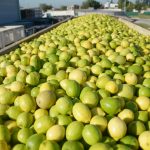Increased demand for Argentine blueberries amid LATAM supply drop

The Argentine blueberry industry is coming to the end of a “satisfactory” season, sending 90% of its volume via airfreight to its different markets.
Up to mid-November, the United States represented 38% of total exports, reaching 3,000 tons. At the beginning of the same month, Argentina exported 360 tons of blueberries to the U.S. alone.
"We were surprised by the lack of fruit that came out of the southern hemisphere and that sparked a lot of interest in fruit from Argentina, which was not exempt from climatic problems, but despite that, it has been a satisfactory season,” Jorge Pazos, president of the Argentinian Blueberry Committee (ABC) tells FreshFruitPortal.com.
The fruit is still in harvest and will continue through the last week of this year.
Related articles: Argentina to start exports of fresh plums to Brazil
Pricing
Pazos says that prices have been good due to there being a low supply of fruit in the market.
"The low production in Peru caused buyers to look at us, and although Argentina is far behind in terms of volume, we were able to put together the season to provide solutions,” he says.
He added that prices are twice as high as they would normally be., .
"We had four or five years where there were no good returns and this probably leads us to look at the current situation with optimism, especially due to flourishing markets like the United Kingdom and the United States."
Argentina’s blueberry industry has sought to be niche, since, as Pazos explains, practically 80% of the fruit is organic.
Pazos indicated that up to week 47, they had a total of 8,500 tons exported where 50% went to the European Union, plus the United Kingdom. The United States received 38% with almost 3,000 tons and the rest to the Middle East, which makes up 5% of the share and 3% to Brazil.
One of the highlights for the industry this season has been to re-enter the U.S. market which had been taken over by Peru, forcing them to focus more on alternative markets like Indonesia, Brazil, Israel and China.
Pazos emphasized that during these difficult times, "the important thing is to try to manage blueberry shipments from Peru, Chile and Argentina to act in a coordinated manner, to generate a constant flow and manage it to have prices that can have a satisfactory return for producers.”
"Flooding the blueberry market has caused a drop in prices, which hurts all producers," says Pazos.













































